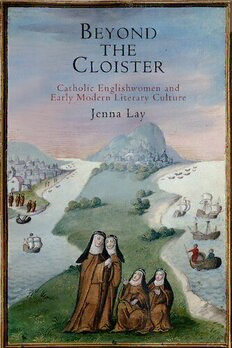
Beyond the Cloister: Catholic Englishwomen and Early Modern Literary Culture PDF
254 Pages·2016·2.762 MB·English
Most books are stored in the elastic cloud where traffic is expensive. For this reason, we have a limit on daily download.
Preview Beyond the Cloister: Catholic Englishwomen and Early Modern Literary Culture
Description:
Representations of Catholic women appear with surprising frequency in the literature of post-Reformation England. Playwrights and poets from William Shakespeare to Andrew Marvell invoke the figure of the nun to powerful and often perplexing effect, and works that never directly address female Catholicism, such as Christopher Marlowe's Hero and Leander, share a discourse with contemporary debates regarding the status of recusant women. Catholic Englishwomen, whether living in convents on the European continent or as recusants in their own country, contributed to these debates, but even as their writings addressed the central religious and political issues of their time, their contributions were effaced and now are largely forgotten. Exploring the writings of Catholic women in conversation with those of Shakespeare, Marvell, Marlowe, Donne, and other canonical authors, Beyond the Cloister shows that nuns and recusants were centrally important to the development of English literature.The defining narratives of early modern England cast nuns as the relics of an unenlightened past and equated Catholic femininity with the dangerous charms of the Whore of Babylon. With careful attention to literary figurations of Catholic femininity and to the vibrant manuscript culture in the English convents, Jenna Lay reveals a far more complex reality. Through their use of tropes, figures, generic patterns, and literary allusions, Catholic women produced politically incendiary and rhetorically powerful lyrics, prayers, polemics, and hagiographies. Drawing on the insights of religious studies, historical formalism, and feminist criticism, Beyond the Cloister offers a reassessment of crucial decades in the development of English literary history.
See more
The list of books you might like
Most books are stored in the elastic cloud where traffic is expensive. For this reason, we have a limit on daily download.
